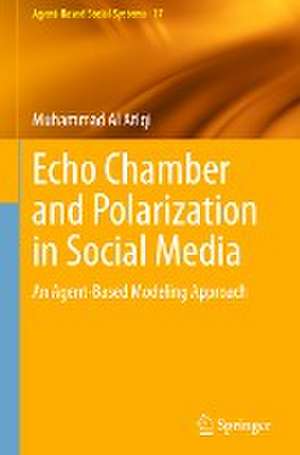Echo Chamber and Polarization in Social Media: An Agent-Based Modeling Approach: Agent-Based Social Systems, cartea 17
Autor Muhammad Al Atiqien Limba Engleză Hardback – 30 mai 2023
The book contains a practical framework to study the factors influencing echo chambers and polarization formation occurring in social media communication. By modeling individual social media users' information consumption, the influence of various behaviors and policies are captured as macro-phenomena. The book also introduces a comprehensive agent-based reinterpretation of the Zaller model, a classic in public opinion research. In addition, the book demonstrates two real-life applications of the model using empirical observations: resolving theconflicting observations of the online echo chamber effect, and modeling the influence of vaccine-related Facebook pages on users’ opinions about vaccination.
| Toate formatele și edițiile | Preț | Express |
|---|---|---|
| Paperback (1) | 617.31 lei 39-44 zile | |
| Springer Nature Singapore – 31 mai 2024 | 617.31 lei 39-44 zile | |
| Hardback (1) | 723.87 lei 6-8 săpt. | |
| Springer Nature Singapore – 30 mai 2023 | 723.87 lei 6-8 săpt. |
Din seria Agent-Based Social Systems
- 20%
 Preț: 1008.77 lei
Preț: 1008.77 lei - 18%
 Preț: 942.94 lei
Preț: 942.94 lei - 20%
 Preț: 990.62 lei
Preț: 990.62 lei - 18%
 Preț: 961.41 lei
Preț: 961.41 lei - 24%
 Preț: 593.11 lei
Preț: 593.11 lei - 15%
 Preț: 642.83 lei
Preț: 642.83 lei - 18%
 Preț: 731.91 lei
Preț: 731.91 lei - 24%
 Preț: 790.89 lei
Preț: 790.89 lei - 24%
 Preț: 583.46 lei
Preț: 583.46 lei - 15%
 Preț: 638.89 lei
Preț: 638.89 lei - 20%
 Preț: 989.46 lei
Preț: 989.46 lei - 15%
 Preț: 578.24 lei
Preț: 578.24 lei - 15%
 Preț: 642.51 lei
Preț: 642.51 lei - 18%
 Preț: 951.29 lei
Preț: 951.29 lei - 20%
 Preț: 986.66 lei
Preț: 986.66 lei - 18%
 Preț: 946.55 lei
Preț: 946.55 lei - 20%
 Preț: 986.99 lei
Preț: 986.99 lei
Preț: 723.87 lei
Preț vechi: 882.77 lei
-18% Nou
Puncte Express: 1086
Preț estimativ în valută:
138.55€ • 144.10$ • 116.10£
138.55€ • 144.10$ • 116.10£
Carte tipărită la comandă
Livrare economică 13-27 martie
Preluare comenzi: 021 569.72.76
Specificații
ISBN-13: 9789819917693
ISBN-10: 9819917697
Pagini: 93
Ilustrații: XV, 93 p. 1 illus.
Dimensiuni: 155 x 235 mm
Greutate: 0.34 kg
Ediția:2023
Editura: Springer Nature Singapore
Colecția Springer
Seria Agent-Based Social Systems
Locul publicării:Singapore, Singapore
ISBN-10: 9819917697
Pagini: 93
Ilustrații: XV, 93 p. 1 illus.
Dimensiuni: 155 x 235 mm
Greutate: 0.34 kg
Ediția:2023
Editura: Springer Nature Singapore
Colecția Springer
Seria Agent-Based Social Systems
Locul publicării:Singapore, Singapore
Cuprins
1. Introduction.- 2. Conceptual Backgrounds.- 3. Agent-based modeling for social simulation methods.- 4. Simulating echo chamber and polarizations problems in social media.- 5. Agent-based interpretation of the Zaller Model.- 6. Application 1: Resolving the conflicting observation of echo chambers in social media.- 7. Application 2: Evaluating the influence of Facebook pages to individual user’s vaccination opinion.- 8. Conclusion.
Notă biografică
Muhammad Al Atiqi is a computational social scientist who studied at the Tokyo Institute of Technology. His interest lies in the intersection of technology and society, particularly the influence of internet-related phenomena to human behavior. During his graduate study, he researched on the formation of echo chamber and political polarization in social media and identifying important factors to determine policies to minimize their negative influences. Prior to his research career, he taught university-level physics at Nanyang Technological University in Singapore. Aside from his main work, he is also involved in community organizing projects such as various Indonesian communities overseas and an environmental project to provide clean water in rural Bali.
Textul de pe ultima copertă
This book addresses increasingly relevant social problems enabled by social media through the lens of system science research and modeling. Instead of evaluating existing patterns from existing social media data, the book focuses on exploring the possibility of various policies. Specifically, it provides fresh insight into the political echo chamber and polarization in social media using agent-based modeling and scenario analysis.
The book contains a practical framework to study the factors influencing echo chambers and polarization formation occurring in social media communication. By modeling individual social media users' information consumption, the influence of various behaviors and policies are captured as macro-phenomena. The book also introduces a comprehensive agent-based reinterpretation of the Zaller model, a classic in public opinion research. In addition, the book demonstrates two real-life applications of the model using empirical observations: resolving the conflicting observations of the online echo chamber effect, and modeling the influence of vaccine-related Facebook pages on users’ opinions about vaccination.
Caracteristici
Provides thorough coverage of the online echo chamber and polarization from the point of view of agent-based modeling Presents an agent-based interpretation of a classic political opinion formation model Contains two applications for relevant problems in including anti-vaccination opinion in social media
